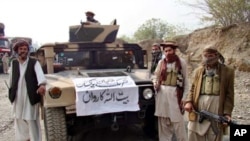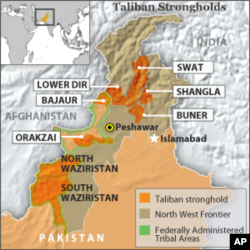A very public crack appeared in the top layer of Pakistan’s most lethal Islamic militant group earlier this week when the deputy of Tehrik-e-Taliban (TTP), Maulwi Faqir Mohammad, was ousted by leader Hakimullah Mehsud.
As the group’s number two commander and deputy, Mohammad led operations in Pakistan’s strategic northwest tribal district of Bajaur near the Afghan border.
No reason was given for his removal by TTP spokesman Ehsanullah Ehsan while talking to journalists, but media reports suggested Mohammad’s support for peace talks, along with a tense relationship with Mehsud, led to his demise.
Mohammad defended himself to reporters, saying he had never disobeyed TTP leadership and that any talks with the Pakistani government were carried out with the permission of the Taliban’s central leadership. While other Taliban officials have denied any talks with the government, Mohammad has been one of the most outspoken proponents of negotiations, arguing that a peace deal in Bajaur could serve as a model for Pakistan’s other volatile tribal agencies.
The rift raises a host of questions and new problems for Pakistan, whose security forces – and ordinary citizens – continue to bear the brunt of attacks carried out by such violent homegrown terrorist groups.
In the short-term, Mohammad’s removal immediately revives security concerns in his former turf, Bajaur. The potential for bloodletting between those who are loyal to the ousted deputy and TTP leader Mehsud could destroy the current relative calm in the district.
Furthermore, Bajaur is strategically located, serving as a route for the cross-border movement of militants between Afghanistan’s Kunar and Nuristan provinces and Pakistan’s tribal regions in its northwest. Bajaur was convenient escape route to Afghanistan for Taliban fighters, who were under fire during a 2009 military operation to eject militants who had infilitrated the region’s renowned resort Swat Valley.
The split is not limited to the TTP’s top leadership, having spread to Pakistan’s affiliated militant groups. Pro-Taliban groups in Pakistan's Khyber tribal agency have been engaged in a bloody fight against one another in the last few weeks. A TTP loyalist group (led by local Taliban commander Tariq Afridi) has been at loggerheads with the ferocious militant group Lashkar-e-Islam in Khyber’s Tirah Valley since last October. Khyber is home to the major supply route for NATO troops in Afghanistan. Militant in-fighting in the region is threatening the security of the only land route from Pakistan to Afghanistan.
Any instability within the TTP and its affiliated groups also greatly affects the Afghan Taliban, particularly the al-Qaida-linked Haqqani network, in its battle against U.S. and NATO forces in neighboring Afghanistan.
The TTP provides sanctuary to Haqqani militants in Pakistan’s North Waziristan tribal agency. The Pakistani Taliban also supplies fresh foot soldiers to the Haqqani network and other Afghan insurgent groups to help carry out attacks against international forces in Afghanistan. A very high profile case in point of their collaboration was the December 2009 killing of seven CIA agents at a base in Afghanistan’s Khost provice, an attack that TTP leader Mehsud claimed responsibility for.
Given its reliance on the Pakistani Taliban, the Haqqani network and other Afghan Taliban groups cannot afford any dissension or disarray in the ranks of the Pakistani militant organization. Afghan insurgents also want the TTP to focus its effort on Afghanistan and not fighting security forces within Pakistan, where its focuses much of its militant activities. Afghan Taliban leader Mullah Omar and Siraj-u-Din Haqqani have reportedly asked their Pakistani counterparts to stop attacks within Pakistan and steer their efforts against foreign troops in Afghanistan.
Analysts in Pakistan say the differences in Taliban leadership and among its ranks can also create an opportunity for the Pakistani government to establish its writ in Taliban-controlled tribal districts and towns. They say the prospects of a continuing rift among the TTP leadership along with repeated U.S. drone strikes against suspected terrorists are benefiting Pakistan’s government as it tries to gain ground in the battle against militants in Pakistan’s northwestern federally-administered tribal areas.









